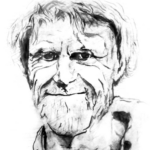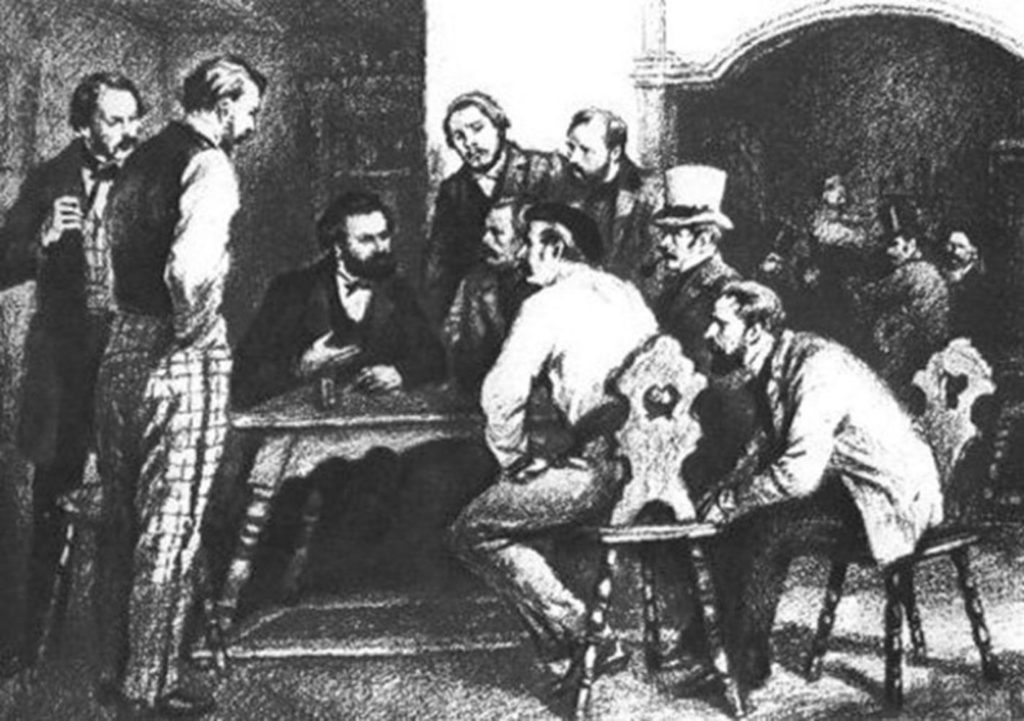Rue de l’Alliance, St Josse ten Noode, just behind the location of what is now the Madou building of the European Commission, May 1845. Three young German intellectuals have just settled in three adjacent houses.
The tenant of n°3 is a certain Moses Hess, a revolutionary socialist unwelcome in his native Germany, who will be remembered for a book published two decades later, Rom und Jerusalem. Die letzte Nationalitätenfrage, the first developed expression of sionism. The tenant of n°7 is called Friedrich Engels. He moved in with his mistress, a factory worker from Manchester, where Engels’ father owns a mill. His wealth will help maintain his neighbour, lifetime friend and co-author, the tenant of n°5, a certain Karl Marx, recently arrived from Paris with his wife and daughters.
All three houses were pulled down long ago and replaced by an office building. But they deserve to be remembered. It is in the rue de l’Alliance that Marx and Engels wrote their first book, Die deutsche Ideologie. It is also in the rue de l’Alliance that Marx scribbled on a scrap of paper his eleven theses on Feuerbach, preciously kept by Engels and published after Marx’s death. Thesis n°11 reads: “The philosophers so far have interpreted the world in various ways. It is now a matter of transforming it.” This is the sentence that features on Marx’s monumental grave in London’s Highgate Cemetery.
The following year, Hess and Engels left Brussels, and the Marx family moved to a house in Ixelles’s rue d’Orléans (today’s rue Jean d’Ardenne next to the Avenue Louise). This house too has disappeared, but a plaque commemorates its location. It is here that Marx wrote, in 1847, the only book he wrote in a language other than German: Misère de la philosophie ou philosophie de la misère, a fierce critique of the French “utopian socialist” Pierre-Joseph Proudhon, then in France, but later also an exile in Ixelles: he lived at n°8 rue du Conseil from 1858 to 1862.
It is also in rue d’Orléans that Marx, then aged 29, wrote a booklet that was to have a mind-boggling success and a massive impact on the fate of our world. Indeed the most populated and fastest growing country in today’s world is still officially claiming to be inspired by its teaching. The Manifest der kommunistischen Partei was written in January and February 1848. It makes a sequence of bold claims about what drives human history and pleads eloquently for the advent a communist society. But it says very little about the contours of Marx’s utopia, about the socialist institutions that would and should replace the capitalist system. This lacuna was only very parsimoniously filled much later in Marx’s Randglossen zum Programm der deutschen Arbeiterpartei, the critical comment which he wrote in 1875 on the first programme of Germany’s social-democratic party. In March 1848, Marx is expelled from Belgium and goes via Paris to London, where he spends most of the rest of his life working on his never completed magnum opus, Das Kapital.
In the same year as Marx writes the Manifesto, another Brusseler publishes his own solution to the key problems of the age, equal to Marx’s in its ambition, if not in its impact. The pretty mysterious Joseph Charlier is then 32. Inspired by Charles Fourier’s variety of «utopian socialism », he publishes in 1848 his Solution du problème social. The cover says « Chez tous les libraires du Royaume », which means that the book was published at his own expense. Its central ideas will be expanded and refined in Charlier’s later writings. His last book, La Question sociale résolue. Testament philosophique d’un penseur, published two years before his death, was written at 54 rue de l’Association, just a few hundred meters from the rue de l’Alliance, where Marx wrote his first one.
Charlier’s point of departure is that the conviction that the earth has been created for the whole of mankind, hence that private land ownership is unjust and that the State must ultimately become the sole owner of the land. This land is to be rented out to households and firms, and the revenues are to be shared equally among all, women and men, young and old, in the form of a uniform monthly “territorial dividend”.
This dividend would suffice to cover everyone’s “absolute needs”, while work would still be required to be able to afford comfort and luxuries. “Hard luck for the lazy; they will have to get by with the minimum allowance. The duty of society does not go beyond this: to assure to all their fair share in the enjoyment of the elements that nature has put at their disposal”. However, covering people’s basic needs unconditionally will not only have the effect of addressing poverty in a way that respects the dignity of the poor. It will also generate more justice at work: “The most dangerous and repugnant jobs will be better paid, full stop. This is the opposite of what happens nowadays.”
Unlike Marx, Joseph Charlier was soon forgotten. But his utopia, unlike Marx’s is more alive than ever. The idea of an unconditional basic income was proposed from time to time over the following century by such bold thinkers as John Stuart Mill and Bertrand Russell. In the early seventies, under the name of “demogrant”, it became the subject of a brief but lively public debate in the United States under the impulsion of James Tobin, John Kenneth Galbraith and other top economists. And since the mid 1980s, a wide spectrum of academics and activists, first in Europe, later in all continents, have come together in defence of this same idea (www.basicincome.org). It was the object of one of the first European Citizens Initiatives made possible by the Lisbon Treaty, and a popular initiative proposing an unconditional basic income gathered the 100 000 signatures it needed to trigger a national referendum in Switzerland by 2016.
Back in his early Brussels days, Marx may well have been right when asserting that philosophers could and should transform the world, not just interpret it. But of the two utopias sketched in Brussels in 1848, the most promising in this respect is arguably no longer the one Marx had in mind.


